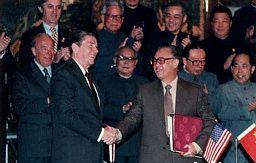|
|
 |
Joint Communiqué on Arms Sales to Taiwan
17 August 1982

President Ronald Reagan shakes hands with Premier Zhao Ziyang on his
trip to China, 30 April 1984

|
Joint Communique of the United States of America and the
People's Republic of China
August 17, 1982
- In the Joint Communique
on the Establishment of Diplomatic Relations on January 1, 1979, issued by the
Government of the United States of America and the People's Republic of China, the United
States of America recognized the Government of the People's Republic of China as the sole
legal Government of China, and it acknowledged the Chinese position that there is but one
China and Taiwan is part of China. Within that context, the two sides agreed that the
people of the United States would continue to maintain cultural, commercial, and other
unofficial relations with the people of Taiwan. On this basis, relations between the
United States and China were normalized.
- The question of United States arms sales to Taiwan
was not settled in the course of negotiations between the two countries on establishing
diplomatic relations. The two sides held differing positions, and the Chinese side stated
that it would raise the issue again following normalization. Recognizing that this issue
would seriously hamper the development of United States - China relations, they have held
further discussions on it, during and since the meetings between President Ronald Reagan
and Premier Zhao Ziyang and between Secretary of State Alexander M. Haig, Jr. and Vice
Premier and Foreign Minister Huang Hua in October 1981.
- Respect for each other's sovereignty and
territorial integrity and non-interference in each other's internal affairs constitute the
fundamental principles guiding United States China relations. These principles were
confirmed in the Shanghai Communique of February 28, 1972
and reaffirmed in the Joint Communique on the Establishment Of
Diplomatic Relations which came into effect on January 1, 1979. Both sides
emphatically state that these principles continue to govern all aspects of their
relations.
- The Chinese Government reiterates that the
question of Taiwan is China's internal affair. The Message to Compatriots in Taiwan issued
by China on January 1, 1979 promulgated a fundamental policy of striving for peaceful
reunification of the motherland. The Nine-Point Proposal put forward by China on September
30, 1981 represented a further major effort under this fundamental policy to strive for a
peaceful solution to the Taiwan question.
- The United States Government attaches great
importance to its relations with China, and reiterates that it has no intention of
infringing on Chinese sovereignty and territorial integrity, or interfering in China's
internal affairs, or pursuing a policy of "two Chinas" or "one China, one
Taiwan." The United States Government understands and appreciates the Chinese policy
of striving for a peaceful resolution of the Taiwan question as indicated in China's
Message to Compatriots in Taiwan issued on January 1, 1979 and the Nine-Point Proposal put
forward by China on September 30, 1981. The new situation which has emerged with regard to
the Taiwan question also provides favorable conditions for the settlement of United States
- China differences over United States arms sales to Taiwan.
Having in mind the foregoing statements of both sides, the
United States Government states that it does not seek to carry out a long-term policy of
arms sales to Taiwan, that its arms sales to Taiwan will not exceed, either in qualitative
or in quantitative terms, the level of those supplied in recent years since the
establishment of diplomatic relations between the United States and China, and that it
intends gradually to reduce its sale of arms to Taiwan, leading, over a period of time, to
a final resolution. In so stating, the United States acknowledges China's consistent
position regarding the thorough settlement of this issue.
- In order to bring about, over a period of time, a
final settlement of the question of United States arms sales to Taiwan, which is an issue
rooted in history, the two Governments will make every effort to adopt measures and create
conditions conducive to the thorough settlement of this issue.
- The development of United States - China relations
is not only in the interests of the two peoples but also conducive to peace and stability
in the world. The two sides are determined, on the principle of equality and mutual
benefit, to strengthen their ties in the economic, cultural, educational, scientific,
technological and other fields and make strong, joint efforts for the continued
development of relations between the Governments and peoples of the United States and
China.
- In order to bring about the healthy development of
United States - China relations, maintain world peace and oppose aggression and expansion,
the two Governments reaffirm the principles agreed on by the two sides in the Shanghai
Communique and the Joint Communique on the Establishment of Diplomatic Relations. The two
sides will maintain contact and hold appropriate consultations on bilateral and
international issues of common interest.
|

Source: United States Information Service |
|

